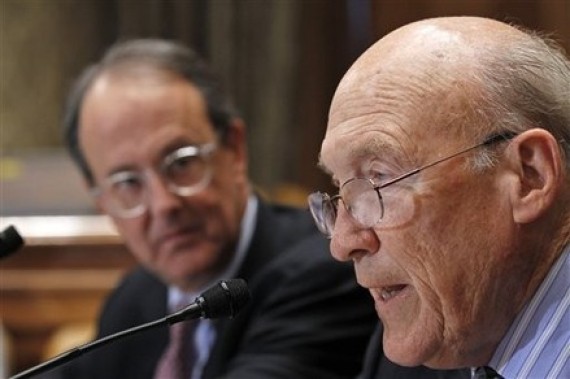Alan Simpson Fights Back Against Deficit Commission Critics
Former Senator Alan Simpson is fighting back against the critics on the left and the right who are shooting down the Deficit Commission's plan before it's even been released.
When he was a Senator from Wyoming, Alan Simpson was hardly a guy to hold back his thoughts, and his recent comments about critics of the Deficit Commission that he co-chairs shows that he hasn’t lost the ability to speak his mind:
CHEYENNE–During Al Simpson’s nearly 50 years in government, he hasn’t been afraid to take on critics and naysayers of his work in the U.S. Senate or on a variety of high-profile commissions and committees.
But as the co-chair of President Obama’s debt commission, the Wyoming Republican said he’s been taking an unprecedented amount of flak for the commission’s draft proposals to help erase the nation’s $13.8 trillion debt.
“I’ve never had any nastier mail or [been in a] more difficult position in my life,” said the 79-year-old Simpson. “Just vicious. People I’ve known, relatives [saying], “‘You son of a bitch. How could you do this?'”
Not surprisingly, many of the debt commission’s draft proposals to cut the debt by nearly $4 trillion by 2020 — from raising the retirement age to 69 by 2075 to bringing in $1 trillion more in tax revenue — have won strong opposition from liberals and conservatives alike.
But Simpson said that while every interest group that testified before his committee agreed that the mounting federal debt is a national tragedy, they would then talk about why government funding to their area of interest shouldn’t be touched.
“We had the greatest generation — I think this is the greediest generation,” he said.
Much like the Commission itself, Simpson has been attacked by both the left and the right for some of the outspoken comments he’s made lately, but he’s absolutely right here. As I noted in my first piece about the Bowles-Simpson proposal, the nature of our political culture makes it unlikely that anyone will tackle the Deficit Commission’s proposals seriously, and Simpson recognizes the problem as well:
All this hubbub isn’t a surprise to Simpson, given how politically polarized the country is these days.
“You don’t want to listen to the right and the left — the extremes,” he said. “You don’t want to listen to Keith Olbermann and Rush Babe [Limbaugh] and Rachel Minnow [sic] or whatever that is, and Glenn Beck. They’re entertainers. They couldn’t govern their way out of a paper sack — from the right or the left. But they get paid a lot of money from you and advertisers — thirty, fifty million a year — to work you over and get you juiced up with emotion, fear, guilt, and racism. Emotion, fear, guilt, and racism.
“Time to go for facts. Everybody’s entitled to their own opinion, but nobody’s entitled to their own facts,” Simpson said, paraphrasing former U.S. Sen. Daniel Patrick Moynihan.
Unfortunately we now live in a world where many people seem to believe quite the opposite, and where the same event can be interpreted quite differently depending on where on the ideological spectrum you happen to fall. When that’s the case, it’s hard to see where the common ground for agreement can even be found.
The Deficit Commission is a good idea, and hopefully its final report will put forward a plan that can serve as a starting point for a rational discussion of what Americans really want from their government, and how they’re going to pay for it. It’s going to be hard to do , though, in a political climate where there will be pushback from the blowhards of the left and the right, which is why it’s good to see someone like Simpson already taking pre-emptive strikes against the demagouges because, as James Joyner noted back in April, Simpson’s credentials in this area are indisputable:
Did Simpson really have “best damn record on no taxes of any son-of-a-bitch in the Senate”? Well, I’m sure there were sons-of-bitches who voted No more consistently. But that only gives them a better record than Simpson if they also voted to drastically cut spending. And maybe not even then, given that such votes would have been token. Simpson, on the other hand, worked to achieve compromises and then voted for the deal that both best achieved his goals and could get through Congress.
Simpson was a small-C conservative of the type frequently found out West. He believed in low taxes, yes, but also fiscal responsibility. And, absent the appetite to control spending — which Republicans make difficult by deifying the Defense budget — that sometimes means increasing taxes. But, Grover Norquist’s desires to the contrary, constantly cutting taxes while piling up debt isn’t conservative at all.
Go get them Alan, at least some of us will have your back on this one.






Oh sure, when he says it it’s okay.
If the GOP was a whole lot more Alan Simpson and a whole lot less Rush Limbaugh I’d be a Republican. At least he sees that there may be a connection between how much we spend and how much we bring in. He’s not a tax-and-spend liberal or a borrow-spend-lie “conservative.”
Hey, Doug. Thanks for the link! Speaking as a blowhard and demagogue of the right, I must say I continue to agree with myself that Simpson, once a favorite of mine, is suffering a “Barbara Bush Moment.”
An image came to mind of current-tossed fronds of seawead dislodged from the ledge that had always moored them by the swells — earthquake, tsunami? — of a great storm at sea, floating to the surface and washing up on the shore to die a slow, agonizing death in the clarifying sunlight of transparency. It’s a Tea Party thing.
So…looks like “suffering” a “Barbara Bush Moment” means simply telling the truth…a pity more people can’t “suffer” from such moments…that probably wouldn’t be a Tea Party thing, though…
It is all very sad, but it probably ties back to the economic illiteracy we’ve instilled in our culture. We’ve allowed credit card companies to market “the more you spend, the more you save.” Why shouldn’t the populous think that works, when they hear it every day?
For rightists who think that “allowed” necessarily means regulation, it doesn’t necessarily. It would have been enough if the media had shouted back at the idiocy of “the more you spend, the more you save.” But no one does.
What’s in your wallet?
An Interested Party: My criticism has mainly to do with Simpson’s gratuitous dissing of Rush as just the opposite side of the extremist coin. How does that uninformed opinion equal “simply telling the truth”?
This is what’s wrong with the right today. Criticize the wrong person — whether it’s Limbaugh, or Palin, or whoever — and you’re suddenly on someone’s “must denounce” list.
Simpson’s point is entirely accurate. The proposal that he put forward along with Erskine Bowles has been demagouged from the left as “the Catfood Commission” because it tries to tackle to Social Security and from the right by people like Limbaugh as some sort of plot to enshrine big government, even though it does more to actually cut the size and scope of government than any conservative who has had political power in the last 20 years has even tried to do.
Alan Simpson’s conservative credentials do not need to be debated or defended. His record as a Senator was quite good, and he was on the short list to be Bush 41’s VP in 1988 (he would’ve been a hell of a better choice than Quayle, by the way). When someone like Limbaugh goes after him, that tells me more about Limbaugh’s motives than it does anything about Simpson
” is suffering a “Barbara Bush Moment.””
It never occured to me that there were some poor souls who actually take Limbaugh seriously.
Scary.
I think the commission was the best way to go. It gives the politicians an “out” and something to stand by on. It is a document to rely on. The other problem is that you cannot leave the feeling that the government just wants to take everything away from everyone-and this is no offense to the commission. It is just one piece of the puzzle. We cannot have the feeling that they take away our jobs (free trade), take away certain aspects of government spending, and take away portions of social security and medicare. In other words people want hope, they want to at least have a job, upward mobility, and prosperity. The commission only looks at government spending and little more than that. Again, don’t take me wrong, this was the job of the commission on spending.
Today, we see the fed printing money to “create jobs” and it is not working. The democrats spend more on social programs like cash for clunkers and extension of unemployment benefits which does not solve the unemployment problem. States have gone to casinos to “create jobs.” And the republicans want more tax cuts to “create jobs,” which we already have had and we still lost our jobs. So, all these methods do not work. And after years of failed ideologies, and we know that they doesn’t work either.
So. the other piece of the puzzle is to create jobs in which we have given away 4 to 8 million manufacturing jobs and also white collar jobs to India. It means you have to invest in the country, in the people, and in the future in which we have not done for two or three decades. As long as we keep sending jobs overseas, we cannot create jobs here. And if you cannot create jobs here, you will only end up with big government and more misery. And you will not be able to cut the deficit and debt.
The commission’s plan continues the nation’s trend of cutting benefits to the poor and middle class while cutting taxes for the rich. Pardon me for not falling in line with it, just because some rich old SOB who hates Social Security has found a way to look virtuous while gutting it.
Take a guess at how we could “pay off” the U.S. National Debt. I recently wondered if we sold all, every ounce, of gold stored in Ft. Knox on the open market and used all of this money to pay off our debt, what would we do with the surplus money? I did the math and the answer, that will surprise you, can be found on my website, sanityandsense.com. The answer will surprise you. R. Van Conoley, sanityandsense.com
> Simpson’s gratuitous dissing of Rush
If you want to prostrate yourself at the feet of someone as pathetic as Rush, go for it. You won’t find a lot of companions here.
R. Van:
Actually I believe it’s about 200 billion. Which is to the national debt as the money in my wallet is to the money in Warren Buffet’s stock portfolio.
I’d go as far to say that tax levels don’t, long term even matter at all. If you’ve decided a given level of spending, then one way or another you’re taking a certain amount of productivity out of the economy. All raising or lowering the tax rate does is determine what portion of that is directly taxen as taxes and what portion is taken by devaluing the dollar. When republicans lowered taxes while increasing spending, all they really did was replace our ‘monetary rulers’ with slightly smaller ones. You don’t get to keep any more resources, it just makes you think your pile is bigger when you measure it. The GOP isn’t so much for lower taxes as it is for increasing inflation.
Point of clarification: This is not the commission’s plan. This is the Simpson-Bowles plan that they released to steal the thunder from the other commision members.
On another point, this is one where I’ll have to look to economists I trust on whether or not it transfers money from the poor and middle class to the rich, something neither Simpson nor Bowles ever seemed to be against.
Is there a good, non-partisan, economists’ response?
Here’s what I found (below). It looks like progressivity is “close enough” to current norms under the plan that the action is moved to whatever else you are doing (with respect to the Bush tax cuts, the payroll tax, and the Alternative Minimum Tax):
http://www.taxpolicycenter.org/taxtopics/bowles-simpson.cfm